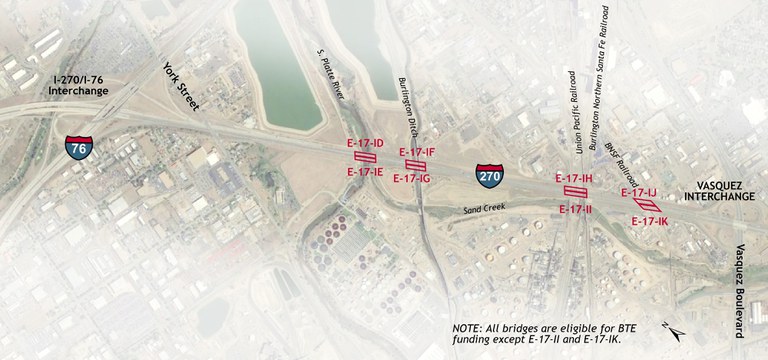CDOT introduces plan to rebuild several bridges along I-270
Travel Advisory
Denver — Today, the Transportation Commission (TC) took an important step towards accelerating delivery on the first phase of several improvements planned for the Interstate 270 corridor, a longtime priority for statewide freight needs and partners in Adams County. Accelerating this phase of the project, which includes replacement of aging infrastructure that has exceeded its planned service life, is the first step of a multi-part approach to delivering the full project included in the Colorado Department of Transportation Ten Year Plan.
The TC action meets one of several new transparency and accountability requirements in Senate Bill 21-260 for large projects procured using alternative delivery methods. In compliance with these requirements, CDOT recently held a virtual public/industry meeting with 142 members of the construction industry and the public to gain understanding of what went into making the decision to use the Construction Manager/General Contractor (CM/GC) method to rebuild eight aging bridge structures along I-270 between York Street and Vasquez Boulevard. The public and the construction industry were invited to provide comments and input on the decision to use an alternative delivery method to deliver this strategic project.
The I-270 Critical Bridge Replacements project will rebuild eight bridges, because it is no longer economical to invest in maintaining and repairing the structures, which have been in service for more than 50 years. Frequent emergency deck repairs require the closure of lanes, which adversely affect the reliability of travel times through the corridor. CDOT is advancing the bridge design so reconstruction of these critical structures can begin as soon as possible.

Four pairs of bridges (total of eight structures) marked in red that need to be replaced.
During the virtual meeting, CDOT recommended using the CM/GC method to rebuild these bridges as safely and efficiently as possible. This method allows for a quicker delivery of complex projects by involving a construction manager to participate early in the design process. This results in a more efficient and complete development of the project scope, which is critical to the success of the delivery of very complex projects such as multiple bridge replacements in a highly congested area. CDOT has a detailed process that guides the project leadership team and stakeholders to choose a delivery method that best manages the risks of the project.
“This industry meeting was an important step in CDOT’s efforts to increase transparency during the process of selecting an alternative delivery method for large projects,” said Region 1 Transportation Director Jessica Myklebust. “The questions and comments we received from the contracting industry will help this safety critical project move forward as quickly as possible,” she added.
The TC approved the CM/GC delivery method for this project during their June meeting. CDOT will start its procurement phase and release requests for proposals to interested design and contracting firms. A full schedule and project scope will be determined after design of the project is further advanced.
Concurrently, CDOT will continue the larger I-270 Corridor Improvements study (Environmental Assessment). The overall project looks to improve safety, reduce vehicle crash rates, improve travel time and reliability, improve truck freight movement efficiency and accommodate multimodal infrastructure. CDOT is working closely with stakeholders, local municipalities and the public on analyzing the overall corridor.
For more information:
I-270 Critical Bridge Project industry presentation (YouTube link)
I-270 Critical Bridge Project presentation (slides)
CDOT’s Alternative Delivery Program
I-270 Corridor Improvements Environmental Assessment process
About the Transportation Commission of Colorado
The state's transportation system is managed by CDOT under the direction of the Transportation Commission of Colorado. The commission is comprised of 11 commissioners who represent specific districts. Each commissioner is appointed by the governor, confirmed by the senate, and serves a four-year term. To provide continuity, the commissioners' term expiration dates are staggered every two years.
